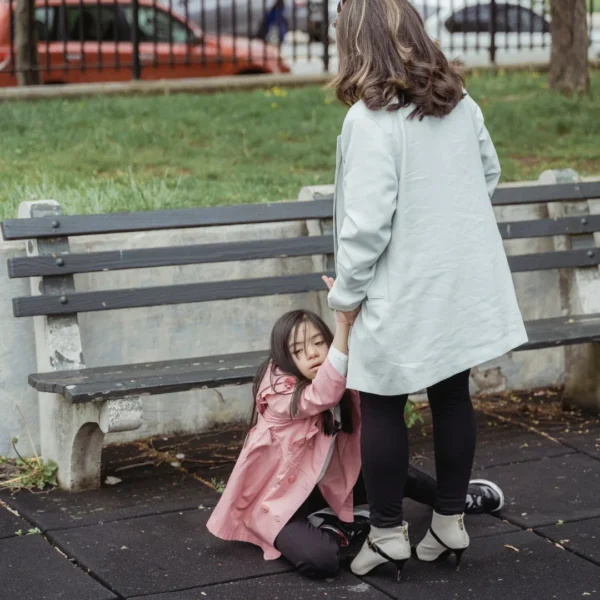Does your child save their sweetest smiles and best manners for Dad, only to turn into a fiery-breathing dragon the moment they’re with you? Indeed, many moms find themselves wondering, “Why does my child act out with me?”
It’s a question that often leads to guilt, self-doubt, and suspicion that you must be doing something wrong. But the truth is, you’re probably not. In fact, those tantrums might be a sign you’re on the right path.
Ironic, isn’t it? Read on! This blog explores why kids lose it around Their Mom, what’s totally normal, and when it might be time to seek extra support.
Naturally, a Child Learns to Express Strong Emotions in a Safe Space
It’s a parent’s job to discipline and guide kids toward respectful behavior, and that journey involves giving children space to act out and throw tantrums. These raw, unfiltered moments are golden opportunities to gently teach and lovingly correct your child so that they grow into a responsible, well-adjusted individual.
In fact, psychologists have found that kids throw tantrums, push boundaries, and display unpleasant behavior around their parents because they feel safe, secure, and emotionally free to let it all out. It’s a normal part of growing up that reflects a deep sense of trust between parent and child.
When tantrums occur at home, it’s usually because the child’s emotions are overwhelming. So the child instinctively turns to their parents, more often their mother, as a safe space to release strong emotions without fear of judgment, rejection, yelling, or punishment.
Differences in Parental Expectations and Parental Attention Shape a Child’s Behavior

Now here’s where things get interesting. Differences in parental expectations and parental attention have a powerful impact on a child’s behavior, particularly during early childhood. Young children observe who hugs them after a meltdown, who enforces the rules, and which behaviors get the biggest reaction.
When one parent is consistent with rules while the other is more lenient, kids naturally test boundaries. A child might throw temper tantrums with their mother and show good behavior with the other, not out of defiance, but in search of clarity and predictability.
Similarly, the kind of attention a child receives plays a crucial role. When a child feels seen, heard, and genuinely loved, they are more likely to build the skills for emotional regulation. If attention only comes after an angry outburst, it unintentionally encourages more tantrums.
Tantrum Triggers and the Environment
Tantrums—including those all-too-familiar toddler tantrums—always happen for a reason, though sometimes that reason feels absolutely ridiculous.
Tantrums occur when your child is hungry, tired, or frustrated due to a sudden change in routine. But sometimes, it’s the little things that set off a big reaction.
A missing doll shoe? Crisis. Someone took a bite out of your child’s chocolate cake? Prepare for an angry, crying, and deeply upset child who’s trying to process the betrayal.
For young children, especially toddlers and preschoolers who are still learning to handle emotions, these minor setbacks can feel like the end of the world. And who gets the front-row seat to all this drama? Moms.
Why? Because your child feels safest with you. Your child knows that even if they lose an expensive toy or demand an entire cake, you’ll still be there, arms open, ready to comfort, support, and laugh once it’s all over.
Frequent Tantrums and Angry Outbursts May Signal Developmental Disorders or Psychiatric Disorders
When temper tantrums become frequent and last longer, often accompanied by aggressive behavior, it may be time to pause and look a little deeper.
According to the National Center for Biotechnology Information,
“Children with language deficits or autism may have more frequent and aggressive tantrum behaviors because of additional frustration associated with difficulty themselves.”
Similarly, researchers at Washington University School of Medicine in St. Louis explain that,
“Long, frequent, violent and/or self-destructive tantrums may indicate the presence of psychiatric illness.”
So if tantrums occur more often and are unusually intense compared to what feels typical for your child’s age, it might be helpful to talk to a child psychologist.
You Can’t Stop Tantrums—Tantrums Happen and That’s Okay

Tantrums are a completely normal part of early childhood development. Toddlers and preschoolers are still figuring out how to express big feelings like anger, frustration, and confusion.
What we can do is reduce the frequency and intensity by understanding the triggers, staying calm and patient during outbursts, and consistently teaching emotional regulation through instilling real discipline. Not yelling, not hitting, and definitely not manipulating a child.
If you think about it, not much changes as we transition into adulthood. We are often on our best behavior at work and social events. The real drama is reserved for the people we feel safest with—our spouses, moms, and besties.
So if your child is loud, brutally blunt, and a little bossy at home, it’s not a sign you’re failing. It’s a sign you’re their safe space. Your little one trusts you enough to be their complete, uncensored self—meltdowns and all. And really, that’s kind of beautiful.

